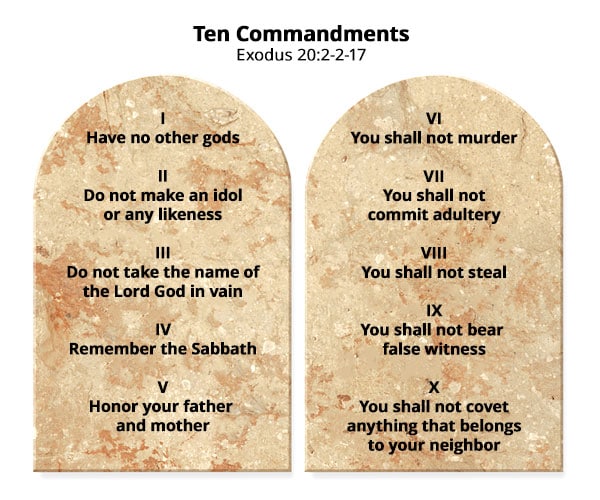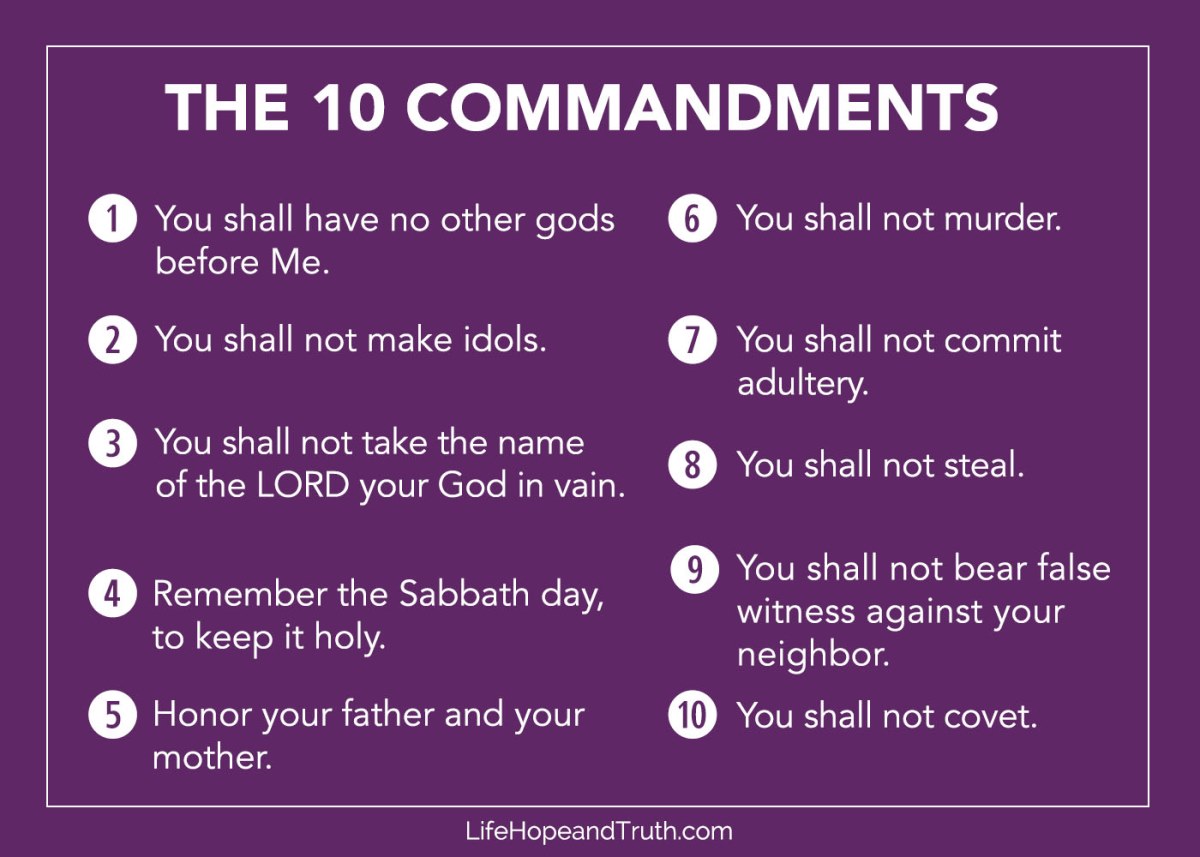The Ten Commandments is a set of biblical standards for behavior. It tells what to do and what not to do as God’s chosen people. The Bible says that God “wrote them on two stone tablets”[1] and gave them to Moses on Mount Sinai, where he had been fasting for forty days and forty nights.
Churchgists will provide you with all the relevant information you are looking for on what are the 10 commandments in the bible in order, moses and the ten commandments, what are the 10 commandments in simple terms, and so much more.

10 commandments in the bible
Thou shalt have no other gods before me.
- Thou shalt have no other gods before me.
- Thou shalt not take the name of the Lord thy God in vain; for the Lord will not hold him guiltless that taketh his name in vain.
- Remember the sabbath day to keep it holy.
- Honor thy father and mother: that thy days may be long upon the land which the Lord thy God giveth thee.
- Thou shalt not kill (or murder).
- Thou shalt not commit adultery (or unchastity).
- Thou shalt not steal (or rob, or ravish, or defraud).
Thou shalt not make unto thee any graven image, or any likeness of any thing that is in heaven above, or that is in the earth beneath, or that is in the water under the earth:
This commandment is probably the most difficult to grasp in our modern age. It’s easy to understand why you wouldn’t want to kill, steal or lie, but what does it mean not to “make unto thee any graven image”? For many, idol worship was an issue that began with their childhood toys. This commandment can be applied literally or figuratively. A literal interpretation means that you should not make any images of things in heaven above (God), on earth (people) or below the earth (animals). However, some believe that the commandment simply means don’t be obsessed with anything in this world—including other people—because God is the only thing that matters.
Regardless of how you choose to interpret it, this commandment also specifically mentions “any likeness.” Some religions believe that merely having a photo of a person is breaking this rule because they are essentially creating a resemblance of a person they are trying to worship—even if that person isn’t God himself. The final phrase—”or anything else in all the earth”—is supposed to prohibit us from making idols for any reason other than for worshipping God himself.
Of course, there are ways around this interpretation: using your imagination rather than seeing an actual image of something can still cause your mind to wander and become tempted by another object besides God. But as long as we are conscious about keeping our thoughts pure and focused on Him at all times, then we will be able to avoid falling into idolatry (Colossians 3:2-3).
Thou shalt not take the name of the LORD thy God in vain; for the LORD will not hold him guiltless that taketh his name in vain.
The second commandment is: Thou shalt not take the name of the LORD thy God in vain; for the LORD will not hold him guiltless that taketh his name in vain.
This commandment means that we must not use God’s name as a curse word, or to make ourselves look good at other people’s expense. It also means that we must never make a false oath or declaration.
In Matthew 5:33-37, Jesus Christ said, “Again, ye have heard that it hath been said by them of old time, Thou shalt not forswear thyself, but shalt perform unto the Lord thine oaths: But I say unto you, Swear not at all; neither by heaven; for it is God’s throne: Nor by the earth; for it is his footstool: neither by Jerusalem; for it is the city of the great King. Neither shalt thou swear by thy head, because thou canst not make one hair white or black. But let your communication be, Yea, yea; Nay nay: for whatsoever is more than these cometh of evil.” (Matthew 5:33-37).
When we promise something to someone else—or give our word on anything—we are making an unspoken agreement with God to keep our promise and follow through on it. If we do this without thinking carefully about what we are promising and why—and whether we can really keep such a promise—then we are breaking this commandment
Remember the sabbath day, to keep it holy.
Remember the sabbath day, to keep it holy. Six days shalt thou labour, and do all thy work: But the seventh day is the sabbath of the Lord thy God: in it thou shalt not do any work, thou, nor thy son, nor thy daughter, thy manservant, nor thy maidservant, nor thy cattle, nor thy stranger that is within thy gates: For in six days the Lord made heaven and earth, the sea, and all that in them is, and rested the seventh day: wherefore the Lord blessed the sabbath day, and hallowed it.
Thou shalt remember that thou wast a servant in the land of Egypt and that the Lord they God brought thee out thence through a mighty hand and by a stretched out arm; therefore shall they Lord they God command thee to do this thing. Deut 5:15
Honour thy father and thy mother: that thy days may be long upon the land which the LORD thy God giveth thee.
This verse is probably one of the most difficult to understand and apply because as you get older and experience life, you realize that not all parents are good parents. Not all ancestors were great people. You may love your country, but not everything about it’s history or current situation.
Does this mean we should no longer honour our father and mother? The answer is: not necessarily.
Honour in Hebrew means “weight.” It holds weight, esteem, value, respect among other things. In the context of our parent’s and ancestors, this commandment isn’t telling us to unconditionally support and uphold them regardless of their actions or choices. Instead it’s reminding us that our parents made choices for us when we couldn’t make them for ourselves and to honour them for raising us as best they could with what they knew at the time. It also reminds us that because of the sacrifices of our ancestors, we are here today on this land so we can continue to live in freedom.
When we look at all the commandments through this lens of honouring those who came before us – parents, ancestors, countrymen etc., we can understand how each commandment fits into a whole picture which is living under God’s law as well as interdependent upon each other.

Thou shalt not kill.
Oops! Click Regenerate Content below to try generating this section again.
Thou shalt not commit adultery.
The seventh commandment is important, because it was one of the 10 commandments given by God at Mount Sinai. It helps us to understand how seriously we should take adultery as a sin.
Adultery is a violation of the seventh commandment, “You shall not commit adultery” (Exodus 20:14).
Adultery is mentioned in the 10 commandments because marriage must be protected from this terrible sin. God commands husbands and wives to remain faithful to each other as long as they both live. Adultery violates that commitment and destroys the trust between them.
Thou shalt not steal.
Thou shalt not steal. It’s one of the ten commandments because it’s important. If you didn’t have this commandment, you might be more likely to steal things. There would be no rules, and then anything could happen!
This is also a good commandment because it tells us we shouldn’t take things that don’t belong to us without permission (unless you’re playing charades or hide-and-seek). You wouldn’t like it if someone took your stuff without asking, so don’t take other people’s stuff either.
Thou shalt not bear false witness against thy neighbour.
- “Thou shalt not bear false witness against thy neighbour”
- Don’t lie or cheat in court
- Don’t gossip or spread rumours
- Don’t be a hypocrite, and don’t tell white lies either
- Be honest with yourself and others, unless you’re being honest about your feelings on the movie The Godfather: Part II
Thou shalt not covet thy neighbour’s house, thou shalt not covet thy neighbour’s wife, nor his manservant, nor his maidservant, nor his ox, nor his ass, nor any thing that is thy neighbour’s.
Covetousness is a sin, because it is the root of other sins. It is the reason why people murder, steal, lie and commit adultery. To covet means to desire something that belongs to someone else. This commandment was broken when Adam and Eve ate the forbidden fruit in the Garden of Eden (Genesis 3:5-6).
The devil deceived them by telling them that they would be like God if they ate of it—desiring what belonged to another led them into sin. Later on Cain killed his brother Abel because he coveted his brother’s position before God (Genesis 4:8-12).
This commandment forbids us from sinful desires towards other people’s property and family members. If we desire something belonging to another person, we should either pray for that person or pray for ourselves so that we may overcome such sinful desires.
These are ten things you shouldn’t do!
- Thou shalt have no other gods before me
- Thou shalt not make unto thee any graven image
- Thou shalt not take the name of the Lord thy God in vain
- Remember the sabbath day, to keep it holy
- Honor thy father and thy mother: that thy days may be long upon the land which the Lord thy God giveth thee
- Thou shalt not kill
- Thou shalt not commit adultery
- Thou shalt not steal
- Thou shalt not bear false witness against thy neighbour
- Thou shalt not covet
What are the 10 commandments in simple terms
1) Thou shalt have no other gods before me.
2) Thou shalt not make unto thee any graven image, or any likeness of any thing that is in heaven above, or that is in the earth beneath, or that is in the water under the earth:
3) Thou shalt not take the name of the LORD thy God in vain; for the LORD will not hold him guiltless that taketh his name in vain.
4) Remember the sabbath day, to keep it holy.
5) Honour thy father and thy mother: that thy days may be long upon the land which the LORD thy God giveth thee.
6) Thou shalt not kill.
7) Thou shalt not commit adultery.
8) Thou shalt not steal.
9) Thou shalt not bear false witness against thy neighbour.
10) Thou shalt not covet thy neighbour’s house, thou shalt not covet thy neighbour’s wife, nor his manservant, nor his maidservant, nor his ox, nor his ass, nor any thing that is thy neighbour’s.
